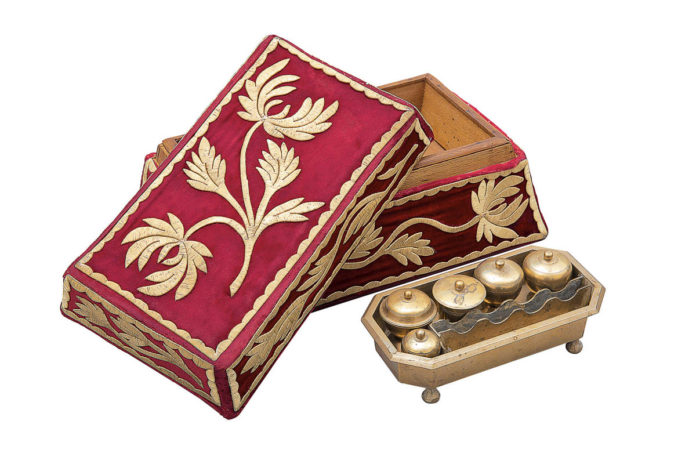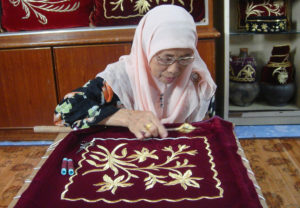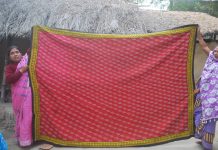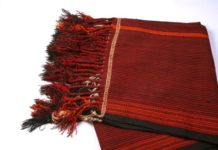
Tekat bersuji or tekat timbul, better known simply as tekat or tekatan, is a type of traditional Malay couched embroidery that employs the use of gold threads on a background of richly coloured velvet, generally maroon. This form of embroidery has long been an integral part of Malay culture, especially in the state of Perak where it was originally a court art associated with royal regalia, palace adornment and rites of passage. With the lifting of the prohibition on luxury items, the art spread to commoners. Perak continues to champion tekat.
The materials needed for tekat are cotton fabric, velvet, cardboard, gold thread, cotton thread, and a rectangular wooden stretcher frame. First, the cotton fabric is fastened onto the edges of the frame, then a smaller piece of velvet sewn onto the stretched cotton cloth. Next, a cardboard template, known as mempulur, of the design to be embroidered, is secured to the surface of the velvet with cotton thread.

Once in place, the embroiderer, seated on the floor behind the frame, passes 4–7 strands of gold thread, which have been cut to the same length and wound onto a cross-shaped bobbin, back and forth across the template. At each pass, she uses her other hand underneath the embroidery frame to anchor the gold threads with a stitch of cotton thread. The method not only produces a raised effect but ensures that the expensive gold thread is not wasted on the underside. The embroiderer takes great pains to ensure that the gold threads are laid flat and close together on the template.
Tekat is often used to decorate ceremonial items like clothing, bedspreads, pillow and bolster cases, betel nut boxes, tray covers, hand fans and shoes, items used mainly during Malay weddings. The most popular tekat motifs are inspired by local plants such as jasmine and hibiscus flowers, paddy stalks and bamboo shoots.
Some of Malaysia’s most prominent tekat experts and teachers include Azizah Mohamad Yusof, who was awarded the title Adiguru Kraf (Craft Master) in 1995, Datin Seri Zabidahtul Radthuan Muhammad Ali Piah and Mardziah Abu Kassim.




